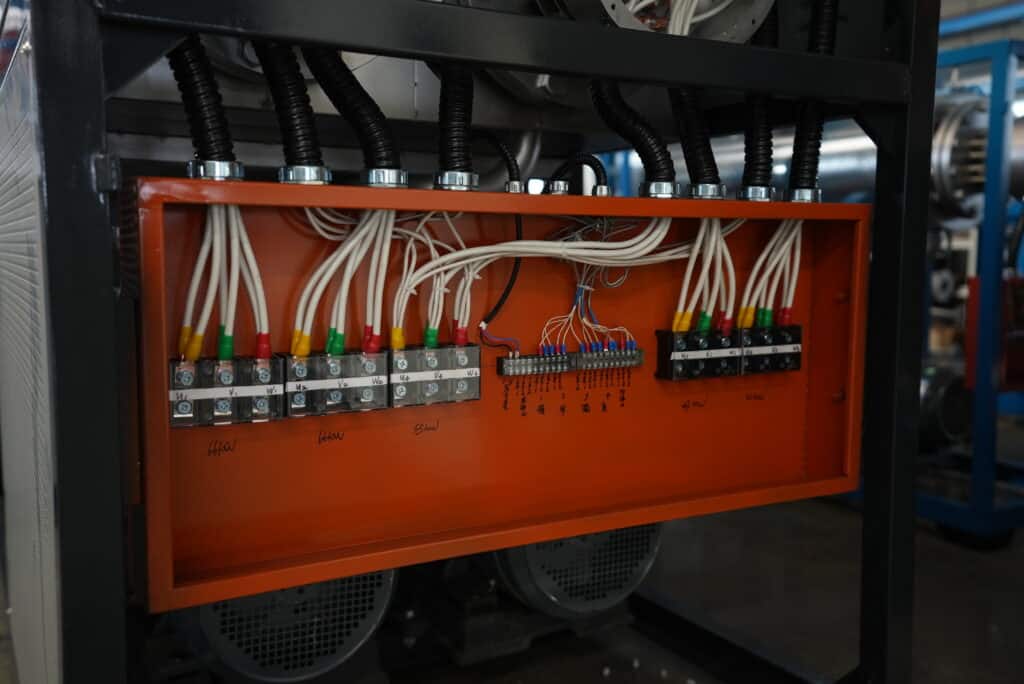Thermal oil boilers play a vital role in modern ships. They provide efficient heat transfer to various systems on board to ensure smooth operation during navigation. In particular, thermal oil boilers demonstrate their unique advantages in heating cargo and ensuring comfort in crew and passenger accommodation areas. This paper explores the importance of thermal oil boilers in maritime applications, particularly in cargo heating and accommodation heating, and demonstrates their key role in the shipping industry.

The Role of Heat Transfer Oil Boilers in Maritime Applications
A thermal oil boiler heats thermal oil (heat carrier oil) and transfers the heat to different equipment and facilities on board through a closed-loop system. When sailing at sea, ships face many complex thermal management needs, especially in long voyages and harsh weather conditions, thermal oil boilers can provide a stable and reliable heat source to ensure efficient and safe ship operations.
1. Cargo heating
When transporting certain specialised cargoes (e.g. crude oil, chemicals, liquid cargoes, etc.), ships need to maintain the fluidity and manoeuvrability of the cargo. Some liquid cargoes, such as crude oil and petroleum products, suffer from increased viscosity and reduced fluidity at low temperatures. In order to ensure the smooth flow of these cargoes and avoid blockages during transport, their temperature must be maintained. In this case, heat transfer oil boilers provide a stable heat source to the goods by heating the heat carrier oil, thus ensuring the temperature and fluidity of the goods.
Advantages of cargo heating::
- Efficient heating: Thermal oil boilers provide even and consistent heating, ensuring that goods are always kept within the optimum transport temperature range.
- Prevents high viscosity: Heating of liquid goods effectively reduces viscosity and prevents poor fluidity due to low temperatures, which can affect transport efficiency.
- reduce emissions through energy conservationThe higher energy efficiency of thermal oil boilers compared to conventional steam heating systems can help ships save on fuel costs and reduce energy waste.
2. Accommodation and heating for crew and passengers
In addition to the need to cater for the transport of goods on board a ship, there is also a need to provide comfortable accommodation for crew and passengers. Especially in the case of a long voyage, the temperature control of the ship's accommodation area is very important. Thermal oil boilers provide a stable heat source for the ship's accommodation area through efficient heat transfer capability, ensuring that the crew and passengers can enjoy a warm and comfortable living space even in the harsh maritime environment.
Advantages of accommodation heating::
- constant temperature: Thermal oil boilers maintain a steady heat output, ensuring that crew and passenger accommodation areas are warm and cosy, avoiding any loss of comfort due to temperature fluctuations.
- dexterity: The thermal oil boiler has a large range of adjustment, able to adjust the temperature according to the needs of different areas, thus improving the flexibility and adaptability of the system.
- High space utilisation: Due to the compact design of the thermal oil boiler, it can effectively save space, which is suitable for the environment with limited space like ships.
3. Heating of ship power systems
In addition to cargo and accommodation heating, thermal oil boilers are used in the power systems of ships. The power system of a ship, especially the normal operation of the engine and related equipment, needs to maintain a suitable temperature to prevent the equipment from overcooling or overheating. By heating the heat carrier oil, thermal oil boilers provide the necessary heat for the ship's power system to ensure its stable operation under different climatic conditions.
Advantages of powertrain heating::
- Anti-freeze function: In cold seas, thermal oil boilers are able to provide warmth to a ship's power system, preventing the unit from freezing due to excessively low temperatures, and ensuring that the ship starts and operates normally.
- Efficient heat transfer: Ensures rapid heat transfer through an efficient heat exchange process, thus increasing the efficiency and reliability of the equipment.
4. Energy efficiency potential in the maritime sector
As environmental protection requirements increase, the maritime industry is placing more and more emphasis on energy saving and emission reduction, and thermal oil boilers offer significant advantages in this regard. Compared with traditional heating systems (such as steam boilers), thermal oil boilers provide more efficient heat transfer and energy utilisation, helping ships to reduce fuel consumption and carbon emissions. This makes thermal oil boilers an important piece of equipment that meets the energy-saving needs of modern maritime.
Energy Saving Advantages::
- High efficiency combustion: Thermal oil boilers typically have high combustion efficiencies, maximising the conversion of fuel into heat and reducing energy wastage.
- low emissionBy optimising the combustion process, thermal oil boilers are able to effectively reduce harmful gas emissions and meet modern environmental requirements.
5. Safety of oil-fired boilers
Thermal oil boilers work differently to traditional steam boilers and usually operate at atmospheric pressure, avoiding the safety risks that can be associated with high pressure steam systems. Thermal oil boilers are safer in maritime applications, especially during navigation where the system may encounter different fluctuating conditions, and operating at atmospheric pressure helps to minimise the risk.
Security Advantages::
- atmospheric operation: The atmospheric pressure design of the thermal oil boiler reduces the risk of explosion or leakage in the system.
- temperature stability: With a precise temperature control system, the boiler can maintain a stable temperature, effectively avoiding overheating or cooling problems and improving the safety and stability of the system.
Our company can non-standard custom products, click the menu bar to contact us to customise, you can also refer to the first!product pageAppreciate our company's products oh!
Recommended Reading:
